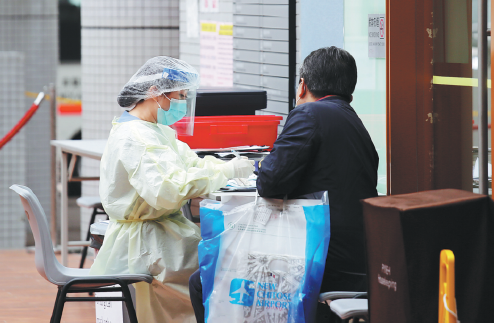Survivors often wracked by emotional scars
Many patients will recover, but some will carry a burden for the rest of their lives. Wang Yuke reports from Hong Kong.

When Sun Jihong became infected with the novel coronavirus, she was convinced she would die.
Instead, the 69-year-old survived after 16 days of treatment at a hospital in Wuhan, Hubei province.
The virus caused coughing, moderate diarrhea and yellowish urine, so Sun called her daughter, a physician. "She rushed home and took me to the hospital for a chest X-ray," Sun said.
The X-ray confirmed she had become infected. The closest hospitals were full because hundreds of people had the virus, but Sun's daughter helped find her a bed.
"I was immediately taken to the intensive care unit, unconscious," Sun said. When she awoke the next day, she felt a little better.
"I lay on the bed. My breathing was labored and I was too weak to move. I was attached to life-support machines with a dozen drip bottles hanging above me. I could feel tears rolling down my cheeks. I never thought I would make it. It was debilitating and intimidating," she said.
"I made my last wishes. I told my daughter where my jewelry was kept and gave her the codes of the locks on my safe-deposit boxes. I lost count of how many times I cried. I thought about my beloved grandson, who lived with me. I thought about my sick husband, whose right side has been paralyzed for over 21 years after a cerebral hemorrhage. He depends on me, but I felt I was leaving him."
Mental turmoil
According to Ivan Mak Wing-chit, chairman of the Public Awareness Committee at the Hong Kong College of Psychiatrists who has followed up on survivors of Severe Acute Respiratory Syndrome, life-threatening illnesses cannot simply be brushed off.
"It's a trauma. Ordinary life stresses can be handled easily, but it won't be like that for people with COVID-19," he said, adding that some patients never fully recover from such an illness because of the heavy emotional scars.
Patients have some initial mental disturbance after a sudden, traumatic emergency. That's "acute stress reaction", he said, noting that the symptoms are very similar to those of post-traumatic stress disorder.
However, acute stress usually only lasts a couple of weeks, while PTSD can last for years or even the rest of a person's life.
Acute stress comes in the first month after a trauma, followed by intense fear and emotional distress. The illness is the primary trigger, but there can be others, and factors such as compulsory quarantine, isolation and absence of social support when the patient needs treatment in seclusion can exacerbate problems.
Deficient medical care can also be a factor, as in the present situation, as patients realize doctors have limited resources to help because the disease is new to them and they have to make "best guesses" for treatment, Mak said.
May Lam, a Hong Kong psychiatrist, said personality can also play a role. For example, some people are prone to anxiety and have a stronger acute stress reaction than others. Vulnerable people often have a "high trait anxiety" personality, which means they tend to complain about fears, worries and other anxieties in situations where most people would barely react.
Mak said anxiety means patients are likely to fixate on "catastrophic thoughts" and look for the worst. Because they lean toward the negative, they tend to amplify their fears or dwell on the source of their stress. As their mood worsens, so does the intensity of catastrophic thoughts, creating a vicious cycle.
Finally, stress can be overwhelming. "There's a balance inside us: On the negative side are insecurity and even the threat of loss of life, and on the positive side is the person's ability to cope and benefit from the support of others," Mak said.
If someone with stress feels the support is inadequate, whether from family members, who cannot visit or talk to them, or doctors who are uncertain about the treatment, the balance tips toward the negative. Then, stress really takes hold.
Despite Sun's melancholic, resigned attitude, she reacted well to treatment, which she attributes to her sound general health.
On Feb 21, her nucleic acid tests were negative, so she was discharged from the hospital. She had to remain isolated for 14 days before going home, so she was taken to a designated hotel.
She went home on March 5. The time leading up to that moment was an emotional roller coaster, especially as she had to have a final nucleic acid test.
"I waited for the result for most of the day. I fidgeted around my room. I started betting that the result would be positive. I thought being sent back to the hospital would be my death sentence. I cried my eyes out," she recalled.
"At about 3:30 pm, the result came. I heaved a long sigh of relief. I felt so good."
She said she had won the hardest fight of her life. "I thank my daughter for hauling me back from death's door. I gave her life 43 years ago, and she saved my life," she said.
Now, Sun cherishes life more than ever. "I'll take good care of my husband, my life companion," she said.
Flashbacks
Mak said that while some people return to normal, others don't. They may have flashbacks and general numbness. They may try to block related thoughts, withdrawing to the point where they no longer make eye contact with people.
He recalled a patient who recovered from SARS in 2003, but remained emotionally scarred.
During the outbreak, both the patient and her husband were infected. Her husband was seriously ill and was transferred to the intensive care unit unconscious, while the woman's condition was mild.
Both survived, but years later the woman started having flashbacks.
"Flashbacks are different from ordinary memories," Mak said. With normal memories people just recall what happened and acknowledge that it was in the past. People with flashbacks believe they're right there, going through the most frightening experiences in their lives in real time, he added.
The more the woman tried to force the memories from her mind, the more intense they became and she had bouts of shortness of breath. Flashbacks can lead to physical symptoms, including muscle tension, breathing difficulties, headaches, chest pains and gastrointestinal discomfort, he noted.
Hysteria
Yu Chengbo, chief physician at the First Affiliated Hospital of Zhejiang University School of Medicine in Zhejiang province, led the first group of medical responders from Zhejiang into one of Wuhan's worsthit coronavirus districts.
The team worked night and day, and Yu was surprised by the mental state of the patients, their hysteria and open hostility.
One 40-something had mild symptoms, but he was distressed about his elderly parents. Feelings of helplessness plagued him and he was inconsolable.
"He could barely stay in the ward. He demanded we let him leave," Yu said. "We couldn't, of course."
The man died after five days. "The disease didn't kill him," Yu said. "His emotional state killed him."
According to Samuel Ho, professor of psychology at the City University of Hong Kong, when people are confronted by a traumatic event caused by something invisible or intangible, they tend to project their fears and hostility onto something tangible as a way of coping.
In the case Yu cited, the patient could find no outlet for his fears. Like many patients, he seemed to regard the medics as somehow connected to his affliction, Ho said.
Moreover, the sight of doctors reminds some patients they are sick, and the medics come to embody the disease. The patients' natural response is "flight", he added.
Yu said it was excruciating to see the patients' displays of "apathy and indifference" toward the doctors.
He believes he can sense a visceral "distrust" of doctors among patients from his experiences. He noticed it in the first couple of days in Wuhan. "When we approached them (the patients), they ran away and hid," he said.
Mak said that is a natural response to potential harm, threat or danger-an evolutionary way of coping with an emergency, embodied in the "flight or fight" theory.
"When someone is in trouble, he may be anxious to the point that he avoids everybody," he said.
Lam, the psychiatrist, said the release of stress hormones, followed by physiological changes that raise the heart rate and blood pressure, are natural self-defense mechanisms that help people prepare for imminent threat and danger.
However, if an excess of stress hormone is released, allowing unpredictability and uncertainty to disturb mental preparations, the stress and anxiety can be unbearable.
"Eventually, the excessive anxiety will affect the immune system, doing no good in fighting illness," she said.
Given the slew of psychological issues that coronavirus patients experience, Mak said it may be too much for front-line staff to juggle providing treatment with offering psychological counseling.
Lam suggested that online psychological counseling could be helpful in situations such as the coronavirus outbreak.
Mak agreed. "Bringing patients' family members in-for example, allowing them to have video calls or bringing them up to date on family matters-could be the best antidote for emotional trauma," he said.


Today's Top News
- China-EU dialogue aims to manage differences
- Rising tariffs set to threaten medical sector
- Airbus launches 2nd Tianjin assembly line
- Plenum doubles down on opening-up to deepen engagement with the world
- Talks rational means to settle differences
- Mainland to enhance exchanges with all political entities in Taiwan






























